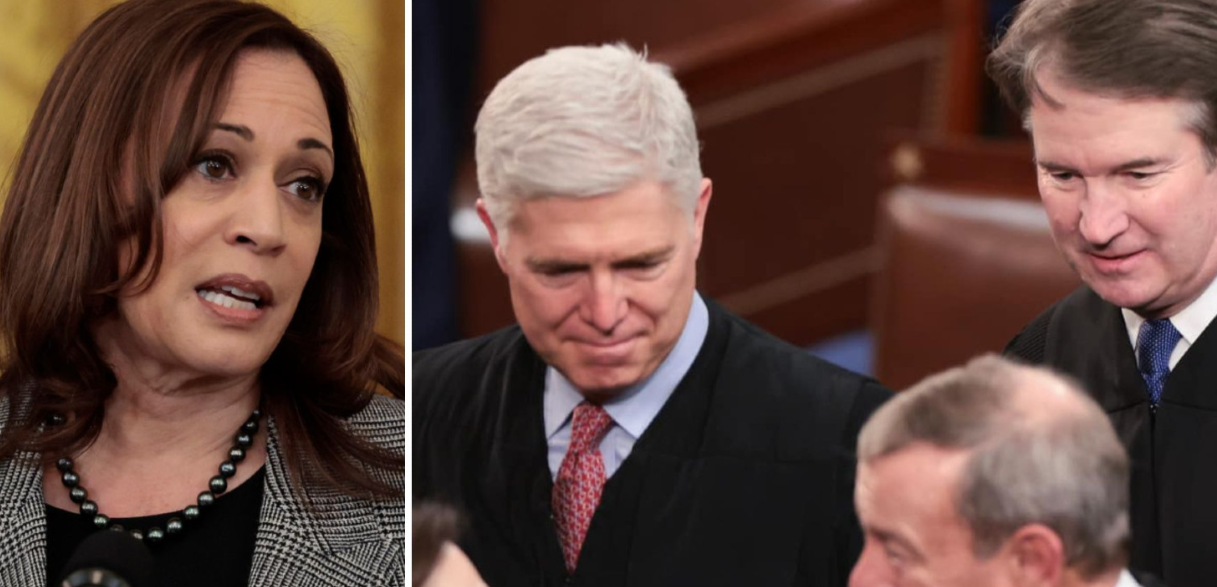GOP Senator Vows To Block ‘Radical’ Supreme Court Picks By Harris

If Vice President Kamala Harris were to become president, a leading Republican senator has pledged to block any "radical" left-leaning Supreme Court nominees she might put forward.
Sen. John Cornyn of Texas, who is a top contender to succeed Minority Leader Mitch McConnell (R-Ky.) when he steps down, made the statement as Republicans anticipate securing a solid Senate majority following the upcoming November elections. This shift in power would give the new Senate majority leader significant influence over the Supreme Court confirmation process.
“I’m not going to schedule a vote on some wild-eyed radical nominee, which I know she would love to nominate,” Cornyn told CNN, signaling his intention to prevent Harris from pushing through any left-wing judicial candidates.
Senate Republican Whip John Thune, another possible successor to McConnell, echoed this sentiment. “We’ll cross the bridge when we come to it,” Thune said, adding, “But, you know, it probably depends on who it is, and that’s the advantage of having a Republican Senate.”
The current Supreme Court has a conservative majority, with six justices nominated by Republican presidents and three by Democrats. Harris, along with other progressive Democrats, has previously advocated for expanding the Supreme Court to allow for more liberal justices. She has also supported ending the Senate filibuster — the 60-vote threshold needed to pass most legislation — although this stance could shift if Republicans gain control in November.
Republicans have strongly criticized the Biden-Harris administration’s long-term proposals to reshape the Supreme Court, accusing them of attempting to politicize the judiciary. In August, the GOP pushed back against these efforts.
“President Biden and I are calling on Congress to pass important reforms — from imposing term limits for Justices’ active service, to requiring Justices to comply with binding ethics rules just like every other federal judge,” Harris said in a statement. “These popular reforms will help to restore confidence in the Court, strengthen our democracy, and ensure no one is above the law.”
The proposals include an 18-year term limit for Supreme Court justices and requirements that justices disclose gifts, avoid political activity, and recuse themselves when facing conflicts of interest. Additionally, the Biden-Harris administration has pitched a constitutional amendment to overturn a recent Supreme Court ruling that granted presidents presumed immunity for core functions of their office.
Although Harris has acknowledged her involvement in formulating these plans, she has not held public events to promote them.
President Biden has expressed his admiration for Harris, stating, “I’ve made clear how I feel about Kamala, and she’s been an incredible partner to me and a champion of surprise throughout her career,” adding that she will remain an inspiring leader.
The White House is also aiming to harness the growing frustration among Democrats regarding the Supreme Court’s decisions, particularly those reversing long-standing precedents on issues such as federal regulatory authority and abortion rights. Democrats have also raised concerns about the actions and relationships of several conservative justices, which they argue compromise the Court's impartiality.
Harris later issued a statement emphasizing the importance of maintaining public trust in a Supreme Court free from ethical scandals and decisions that disregard established precedent. She reiterated that the proposed reforms “will help to restore confidence in the Court, strengthen our democracy, and ensure no one is above the law.”
Biden has argued that term limits would bring stability to the nomination process and ensure regular changes in the Court’s composition. However, the country’s founders designed lifetime appointments for federal judges and Supreme Court justices to protect them from political influence.
Though justices hold lifetime appointments, they can be removed through impeachment, although this is rare. Only one justice, Samuel Chase, was impeached in 1805, but he was not removed from office.